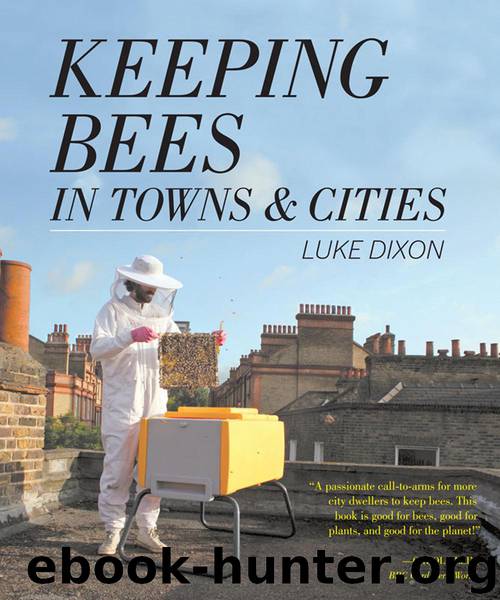Keeping Bees In Towns & Cities by Luke Dixon

Author:Luke Dixon
Language: eng
Format: mobi, epub
Publisher: Timber Press
Published: 2012-08-20T21:00:00+00:00
Bees on a queen excluder
Uncapping
The bees put a little wax cap on each cell when it is full of honey. To get the honey out you first need to take off the caps. Of course bees can uncap the honey themselves. When they need to feed on their stores they will neatly take off the wax cap, one cell at a time, and remove the honey. Through the winter months little piles of tiny wax flakes can be found at the bottom of the hives, an indicator (if you remove the tray from beneath the mesh floor) of whereabouts in the hive the colony is.
There are many ways for beekeepers to do the uncapping, and for my first harvest I used the simplest, an ordinary serrated kitchen knife. It does take some practice, and my first attempts saw broken comb, wax, and honey everywhere.
Eventually both sides of the frames were uncapped, and we were ready to spin. A honey spinner is like a dustbin with a wire container inside on a central pivot to hold the frames of honey. John had brought a spinner with him in the car, and we loaded up the first batch of frames. Our hand-powered spinner held just four frames, but there are other monsters that hold many more and are operated with an electric motor. First frames in the spinner, I turned the handle and the frames began to spin. Slowly I increased the speed and the centrifugal force made the honey fly out of the comb in fine threads of liquid gold, which stuck to the side of the extractor and slowly dribbled down to the bottom. The smell was quite wonderful. And dipping my finger into the comb, I could get my first taste of my first honey harvest.
It was hard work. Four frames at a time we extracted the honey, turning the handle, slowly at first but then building up speed, careful not to go too fast lest the combs break. The wire in the wax foundation helped keep them together, but even that is not enough to hold the wax in place if the spinner is turned too quickly. By the time we had finished there was honey everywhere. All over the table, on the floor, and in a bucket filled with the cappings we had removed.
But there was also an old Turkish pickled gherkin container filled with frothy honey that had come out through a tap at the bottom of the spinner. It was impossible for me to lift on my own. We had harvested nearly 100 pounds (45 kg) of the most natural food on the planet. All I had to do now was take it home, filter it through a sieve to take out any bits of wax and the odd dead bee, and bottle it. But what was it that I had in my giant bucket? What exactly is honey and how do the bees make it?
What is honey?
The nectar that the bees collect to make honey from is a dilute solution of the sugar sucrose.
Download
This site does not store any files on its server. We only index and link to content provided by other sites. Please contact the content providers to delete copyright contents if any and email us, we'll remove relevant links or contents immediately.
Craft Beer for the Homebrewer by Michael Agnew(18228)
Marijuana Grower's Handbook by Ed Rosenthal(3668)
Barkskins by Annie Proulx(3361)
Project Animal Farm: An Accidental Journey into the Secret World of Farming and the Truth About Our Food by Sonia Faruqi(3211)
The Plant Messiah by Carlos Magdalena(2920)
Red Famine: Stalin's War on Ukraine by Anne Applebaum(2916)
0041152001443424520 .pdf by Unknown(2842)
Organic Mushroom Farming and Mycoremediation by Tradd Cotter(2684)
In the Woods by Tana French(2579)
Beer is proof God loves us by Charles W. Bamforth(2450)
7-14 Days by Noah Waters(2407)
Borders by unknow(2300)
Between Two Fires by Christopher Buehlman(2296)
Reservoir 13 by Jon McGregor(2292)
Meathooked by Marta Zaraska(2255)
The Art of Making Gelato by Morgan Morano(2247)
Birds, Beasts and Relatives by Gerald Durrell(2213)
The 7 Habits of Highly Effective People: Powerful Lessons in Personal Change (25th Anniversary Edition) by Covey Stephen R(2187)
The Lean Farm Guide to Growing Vegetables: More In-Depth Lean Techniques for Efficient Organic Production by Ben Hartman(2123)
